Regards
Keywords
Masoud Kimiai, Dash Akol, Sadegh Hedayat, masculinity, Iranian cinema, Iranian classical music, silence
Document Type
Article
Abstract
The Persian term pahlavan represents an archetypal character of a strong man who is generous, uncorrupted, and humble in the face of weakness. This paper will focus on sonic aspects of the pahlavan by zooming in on one of Masoud Kimiai’s films, Dash Akol (1971), which is based on a story of the same name by Sadegh Hedayat. First, I will concentrate on how the movie links heroic masculinity to the Persian classical music mode Chahargah and the instrument tombak-e zurkhaneh, and contrasts it with the tragic and romantic associations of Dashti, another Persian classical mode, representing another, more vulnerable facet of the protagonist’s character to highlight his inner tension. Secondly, I will explore the role of silence and non-verbal communication in the plot, dialogue, and characters. I will demonstrate how the silence of Dash Akol's character regarding his love for young Marjan echoes a history of masculine ethics of silence, also intertwined with Iranian mysticism and lyricism.
Résumé
Le terme persan pahlavan représente le caractère archétypal d’un homme fort, généreux, non corrompu et humble face à la faiblesse. Cet article se concentrera sur les aspects sonores du pahlavan en zoomant sur l’un des films de Masoud Kimiai, Dash Akol (1971), basé sur une histoire du même nom de Sadegh Hedayat. Tout d'abord, je me concentrerai sur la façon dont le film relie la masculinité héroïque au mode de musique classique persan Chahargah et à l'instrument tombak-e zurkhaneh, et le contraste avec les associations tragique et romantique du Dashti, un autre mode classique persan, représentant une autre facette, plus vulnérable, du protagoniste pour mettre en valeur sa tension intérieure. Deuxièmement, j'explorerai le rôle du silence et de la communication non verbale dans l'intrigue, les dialogues et les personnages. Je démontrerai comment le silence du personnage de Dash Akol concernant son amour pour le jeune Marjan fait écho à une histoire d'éthique masculine du silence, également mêlée au mysticisme et au lyrisme iraniens.
Recommended Citation
Salavati, Kamyar
(2023)
"Iranian Music, Silence, and the Representation of the Traditional Masculine Figure of the Pahlavan: A Case Study of "Dash Akol" (1971),"
Regards: Vol. 30:
No.
30, Article 2.
DOI: 10.70898/regards.v0i30.869
Available at:
https://e-journals.usj.edu.lb/regards/vol30/iss30/2


